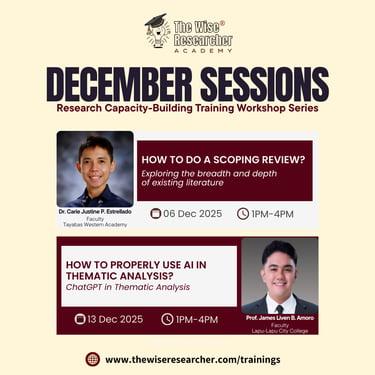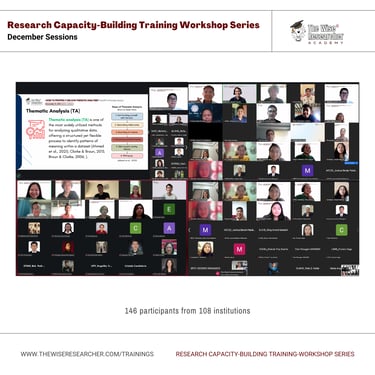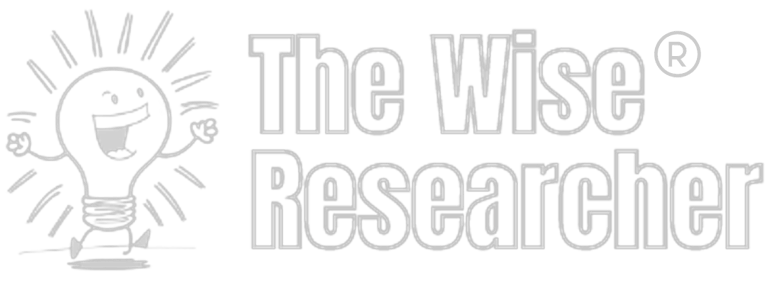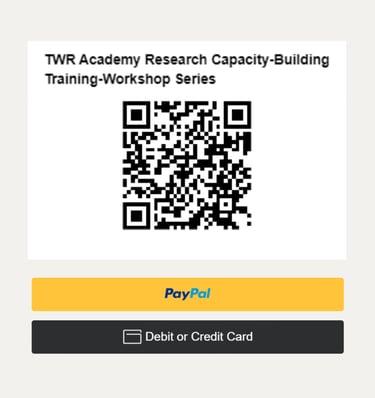

Research Capacity-Building Training Workshop Series
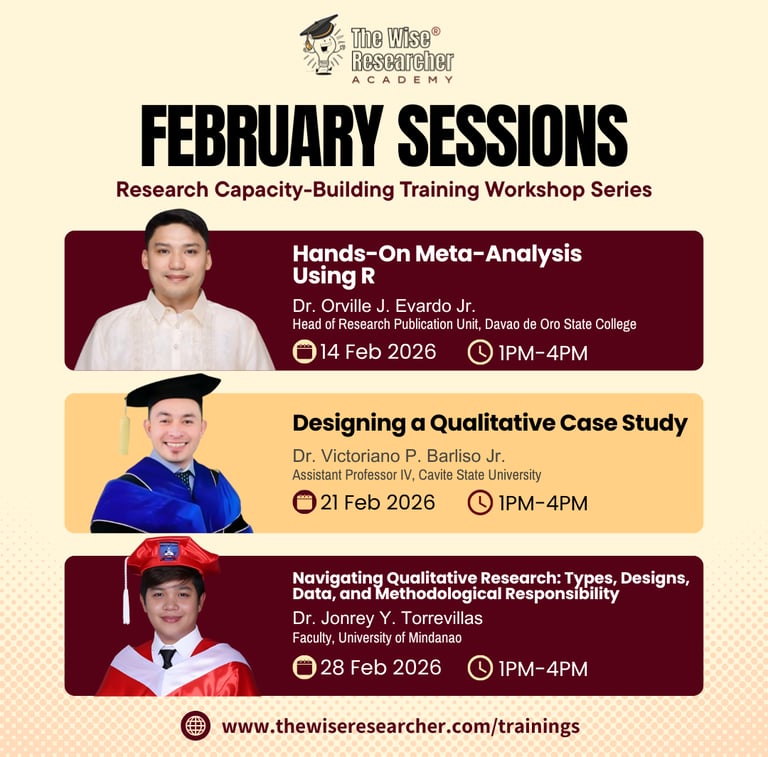

Organizer
The Wise Researcher (TWR Publishing) invites you to participate in the Research Capacity-Building Training-Workshop Series. This series of training workshops aims to enhance participants' research skills and capacity by providing essential tools, techniques, and knowledge to conduct high-quality research. Through hands-on sessions and expert guidance, participants will be empowered to develop and strengthen their research capabilities, enabling them to contribute more effectively to their respective fields.
Testimonials
"The training started on time, and the questions asked during the training were all answered and cleared up."
Viovic P.
"The insights I harnessed in the training are truly beneficial and helpful to my career as a researcher. The discussion went well, and all of the topics were explained clearly."
Al-fahad J.
"The sessions are thought-provoking yet informative. The speakers have explained and provided examples appropriate for the stipulated topics."
Jefferson B.
"The sample exercise helped us, the audience, to have a better grasp on what was being discussed."
Dayanara T.
"The topics discussed are very helpful not only for the teachers but also for the students. I discovered a new software (Jamovi), which is very user-friendly and has a nice interface."
Irish A.
"Everything went well, and it was really an informative and knowledgeable session."
Jelly C.
"The seminar/workshop was a success. Engr. Acenas was a good speaker/facilitator and very knowledgeable about the topic. I learned about coding, which made me understand the concepts better than reading an entire book."
Michelle M.
"We had a very interesting and insightful discussion with the speaker. The speaker enlightens us a lot on how to go through qualitative data analysis. I really love it."
Dexter Z.
"Excellent! Engaging content that provides relevant and high-quality information about research."
Leonora E.
"The interactive sessions and group discussions/breakout sessions encouraged engagement and deeper learning. The resource speaker is knowledgeable and responsive to participants' questions, which enriched the overall learning experience."
Julienne C.
"The training objectives were met; the resource speaker has explained well all concepts with accompanying demonstrations."
Katherine A.
Topics
Hands-On Meta-Analysis Using R (February 14, 2026; 1 PM - 4 PM)
This webinar–workshop provides a step-by-step, beginner-friendly yet rigorous introduction to conducting meta-analysis using the R programming environment. Participants will learn how to prepare data, run common meta-analytic models, check assumptions, and interpret outputs using widely used R packages such as metafor. The session combines conceptual discussions with guided hands-on coding, allowing participants to experience the full workflow of meta-analysis—from data preparation to reporting of results. The workshop is ideal for faculty researchers, graduate students, and professionals seeking to enhance their research analytics skills.
Objectives:
Understand the fundamental concepts, principles, and applications of meta-analysis in research;
Perform basic and advanced meta-analytic procedures using R, including effect size computation, heterogeneity analysis, and forest/funnel plot generation; and
Interpret and report meta-analysis results appropriately, following academic standards and ethical guidelines for systematic synthesis of research findings.
Designing a Qualitative Case Study (February 21, 2026; 1 PM - 4 PM)
This 3-hour online workshop focuses on designing a qualitative case study to gain a rich, contextual understanding of a complex issue. It guides participants in framing strong “how” and “why” research questions and defining a clear, manageable case. The session emphasizes practical design decisions that make case studies feasible and meaningful. Participants will learn how to set case boundaries and examine the case from multiple perspectives. The workshop also covers selecting appropriate qualitative data sources and planning basic data collection. Rather than advanced techniques, the focus is on core elements of sound case study design. The approach supports exploring new or not yet fully understood phenomena. By the end of the session, participants will have a concise draft case study design they can immediately refine and use.
Objectives:
Formulate “how” and “why” qualitative research questions suited for an in-depth case study;
Define and clearly bound a case to allow rich, contextual investigation of a complex issue;
Select appropriate qualitative data sources that capture multiple aspects of the case;
Develop a basic plan for collecting and organizing qualitative evidence within a single case; and
Draft a concise qualitative case study design that can be used to explore a new or not yet fully understood phenomenon.
Navigating Qualitative Research: Types, Designs, Data, and Methodological Responsibility (February 28, 2026; 1 PM - 4 PM)
This seminar provides a comprehensive guide to conducting qualitative research with rigor and methodological responsibility. Participants will explore the key types of qualitative research—including experience-centered, language/interaction-centered, context/system-centered, theory-building, and text/artifact-centered approaches—and understand how each type informs research design. The seminar also emphasizes data collection strategies, including participant-based and corpus/text-based sources, and guides participants in interpreting and analyzing data responsibly. Through this seminar, researchers will gain practical insights into making informed decisions at every stage of qualitative inquiry while upholding ethical and methodological standards.
Objectives:
Explain the core principles of qualitative research and its interpretive, context-sensitive nature;
Identify and differentiate the major types of qualitative research and understand the implications of each for design and data collection;
Select and justify appropriate research designs for different qualitative research types;
Recognize and apply strategies for collecting qualitative data, including participant-based and text/corpus-based sources;
Interpret and analyze qualitative data responsibly, making theory-informed decisions while reflecting on methodological and ethical implications; and
Demonstrate methodological responsibility by understanding how choices at each stage—from type to analysis—impact the credibility, trustworthiness, and ethical integrity of qualitative research.
Resource Speakers
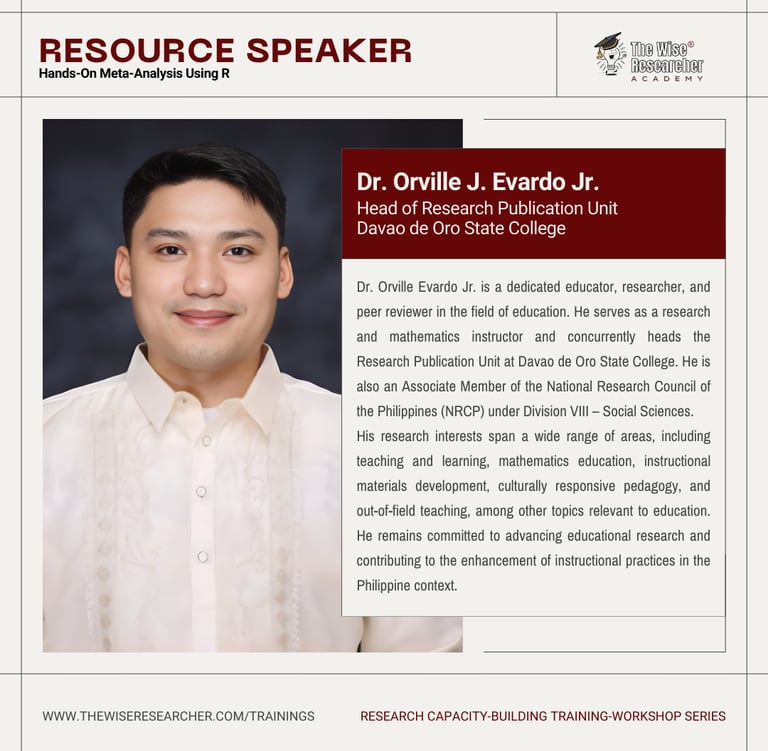

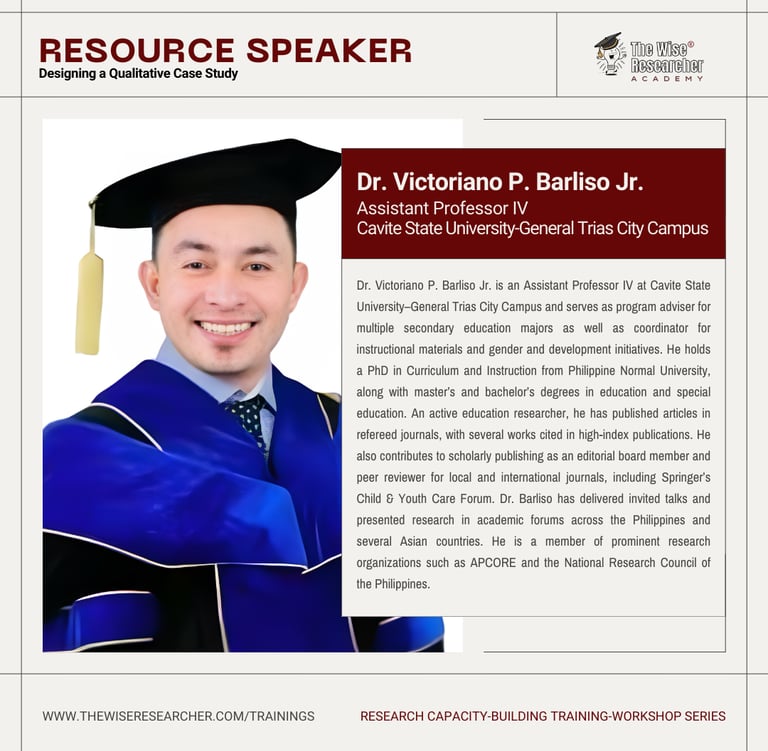

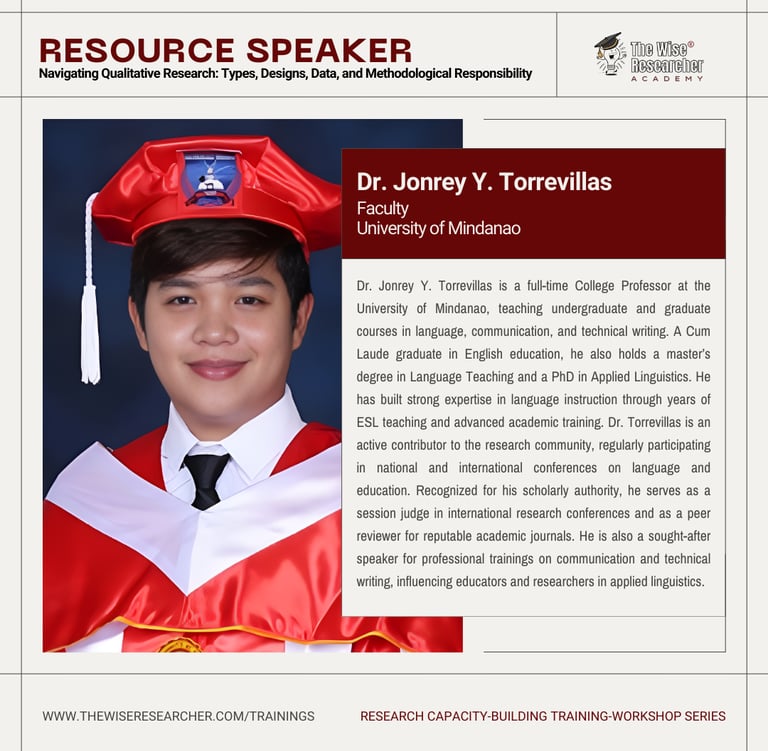

Registration Fees (per session)
Professionals: ₱350
Students: ₱250
Registration Process
Step 1: Pay the registration fee using any of the QR codes below.
Note: Take a screenshot of your proof of payment.
Step 2: Fill out this registration form - https://forms.gle/uSdsBtbxhyVNt7N67
Step 3: Wait for a confirmation of successful registration from the Secretariat.
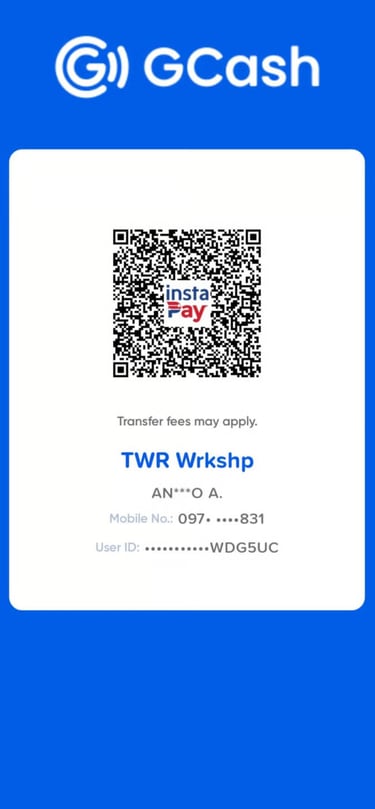

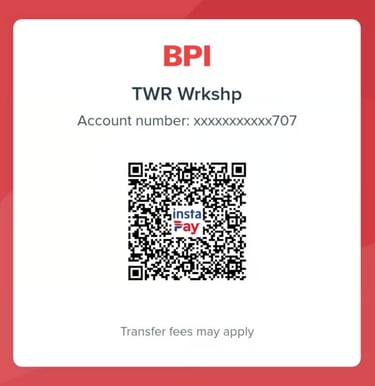

Requirements
Zoom Account. Please make sure to create a Zoom Account by visiting https://zoom.us/signup.
Laptop.
Internet Connection. Ensure a stable internet connectivity.
Post-Training Workshop
Participants will be awarded a Certificate of Training Workshop Completion and a Certificate of Attendance.
We will email an official receipt for the registration payment upon request. If you require the original copy of the official receipt, we can send it. Please note that the requester will shoulder the shipping fee.
We will provide a hard copy of the certificates at Php 50.00 per copy upon request. Please note that the requester will shoulder the shipping fee.
Participants will be provided a link to access the training workshop recordings and materials for review.
Invitation Letter
We provide personalized invitation letters upon request. To request, please fill out this form.
For inquiries, contact:
TWR Academy Secretariat
workshop@thewiseresearcher.com
December 2024




February 2025




March 2025




April 2025



May 2025



June 2025



August 2025
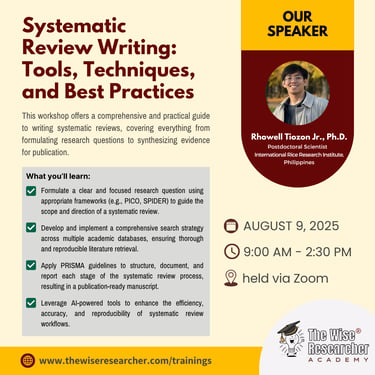
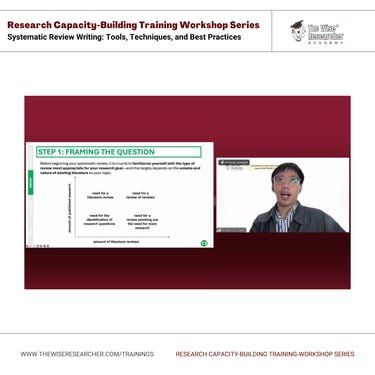
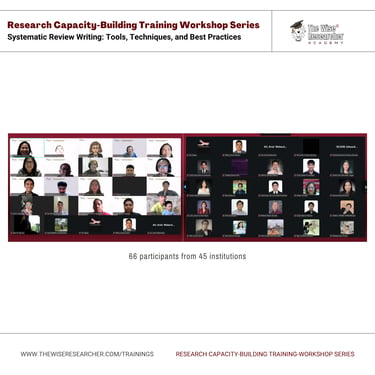
September 2025
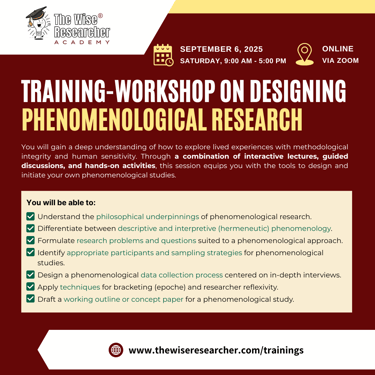
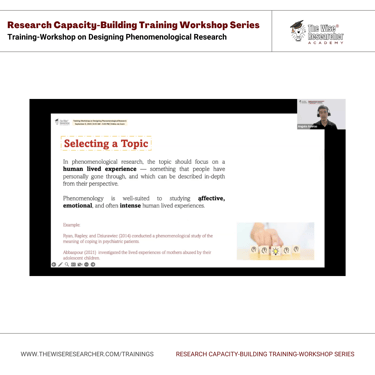
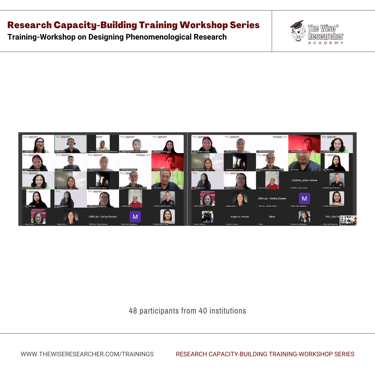
November 2025
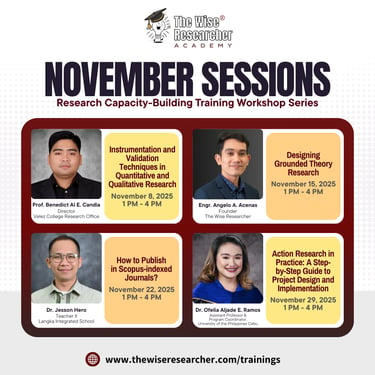
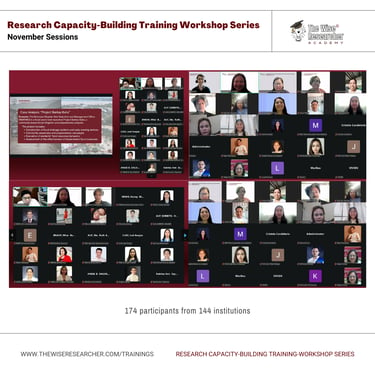
December 2025
